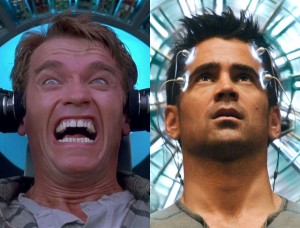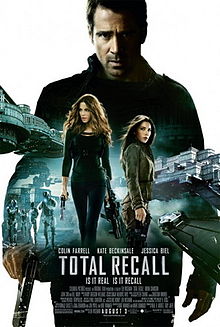This last weekend saw the debut of Total Recall, the “remake” or revisioning of the 1990 film of the same name starring Arnold Schwarzenegger and Sharon Stone. Both films are loosely based upon the short story “We Can Remember it for you Wholesale?” by Philip K. Dick. But whereas the 1990 film involves a significant portion of the story taking place on the planet Mars, the 2012 film, directed by Len Wiseman, takes place completely within an earthly setting.
The new film finds Douglas Quaid (played by Colin Farrell) living in a future dystopia where chemical warfare in the past has rendered much of the globe uninhabitable. There are now only two places that can sustain human life, and on opposite sides of the planet, including a new form of Great Britain where corporations, the wealthy, and jobs are located, and the former Australia now known as The Colony, a crowded, low income area that resembles a dirty form of Hong Kong more than anything else. Those who live in The Colony are the workers who commute each day via The Fall, a huge mechanism that literally goes into an immense tunnel through the earth. Quaid is experiencing recurring nightmares of a much more adventurous form of life that also involves a beautiful woman, Melina (played by Jessica Biel), and yet when he awakes the reality is that he works a robotic assembly line producing synethetic police officers and is married to Lori (Kate Beckensale). One day he gives into his desire to visit Rekall that implants fantasy memories of your choice, and after selecting a secret agent scenario, he finds himself in the middle of a dangerous situation that causes him to question his identity and understanding of reality. Has Quaid “blown his memory cap” to uncover his real identity as a wanted double agent, or has he begun to experience his false memories implanted by Rekall?
With the exception of the shift of the totality of the storyline to earth rather than including a major segment on Mars, the 2012 version follows the general thrust of the 1990 film. It also includes various forms of homage to the original film, although a major opportunity was missed at the conclusion of the film with the (spoiler alert) shooting and death of Quaid’s “wife” (played by Kate Beckensale, where the line “Consider that a divorce!” would have made for a final fitting tribute to the original, and more in keeping with the flow of the narrative than the inclusion of the three-breasted woman based upon a mutant from the first film.
 The 2012 version of Total Recall is far darker thank the 1990 outing reflecting the pessimism of our time and resulting in the dystopian conception of the future. Here our present concerns over environmental degradation, international warfare, and economic inequalities are especially evident. On the latter, one can read our present political and economic climate into the depiction of the film with the Great Britain landmass symbolizing “evil” corporations and big business, corrupt political leaders, and concentrations of wealth. The Colony may be symbolic of “the 99%,” which goes through the motions in a form of economic slavery. This is evidenced not only by the actions of those who live in the squalor of The Colony, but also through some of Quaid’s dialogue as he boards The Fall with a co-worker and prepares for yet another installment in the daily grind. Quaid wonders why no one questions the routine and yearns for something different, and just prior to this discussion we see signs on the walls questioning the status quo and claiming that “the Fall leads to slavery.” On a theological side note, it is interesting that read from the perspective of the Christian myth the same could be said but with alternative meaning: the failure of human beings to live up to their connection to the divine, the fall of a different kind, has plunged the race into slavery resulting in lives lived in less than ideal fashion.
The 2012 version of Total Recall is far darker thank the 1990 outing reflecting the pessimism of our time and resulting in the dystopian conception of the future. Here our present concerns over environmental degradation, international warfare, and economic inequalities are especially evident. On the latter, one can read our present political and economic climate into the depiction of the film with the Great Britain landmass symbolizing “evil” corporations and big business, corrupt political leaders, and concentrations of wealth. The Colony may be symbolic of “the 99%,” which goes through the motions in a form of economic slavery. This is evidenced not only by the actions of those who live in the squalor of The Colony, but also through some of Quaid’s dialogue as he boards The Fall with a co-worker and prepares for yet another installment in the daily grind. Quaid wonders why no one questions the routine and yearns for something different, and just prior to this discussion we see signs on the walls questioning the status quo and claiming that “the Fall leads to slavery.” On a theological side note, it is interesting that read from the perspective of the Christian myth the same could be said but with alternative meaning: the failure of human beings to live up to their connection to the divine, the fall of a different kind, has plunged the race into slavery resulting in lives lived in less than ideal fashion.
One of the central aspects of both the 1990 and 2012 versions is the question of identity, and epistemological questions of what is real and how one tells the difference between reality and illusion. This is explored more deeply in this film with some of the more significant explorations coming near the film’s end with an exchange between Quaid and Matthias, the leader of the rebellion (played by Bill Nighy). The thrust of Matthias’ advice to Quaid is that while he may want to remember his past so as to know who he is in the present, what is really important is who one chooses to be in the now. I found this advice curious in that while self-identity is a fluid concept that can be created and recreated due to the choice and perceptions of the individual, nevertheless, this is intimately connected to one’s past and future actions as well. The film also fails to address the overriding question of how one separates fact from fiction in the experience of “reality,” a trait it shares in common with The Matrix.
The critical commentary on this film has been mixed, with some of the positive reviews arguing that the film should be seen for the impressive visuals if nothing else, and the negative reviews arguing that the 2012 attempt fails to live up to the quality of the 1990 version and adds nothing new to the cinematic experience. I was troubled by the negative reviews, but after watching the film I was pleasantly surprised. In my view the 1990 film, while entertaining, was certainly no in-depth or classical piece of science fiction, and the script, along with Schwarzenegger’s performance, came across as traditional action film fare with a little camp. By contrast, although action is still center stage in the 2012 version, this film seems to take itself a little more seriously, and to incorporate some of the cultural influences surrounding it, including those mentioned above, as well as cinematic influences from Blade Runner to I, Robot. Although Total Recall failed to shake The Dark Knight Rises from the number one spot in the box office last weekend, nevertheless in the opinion of this reviewer it is a science fiction film worth watching.






There are no responses yet